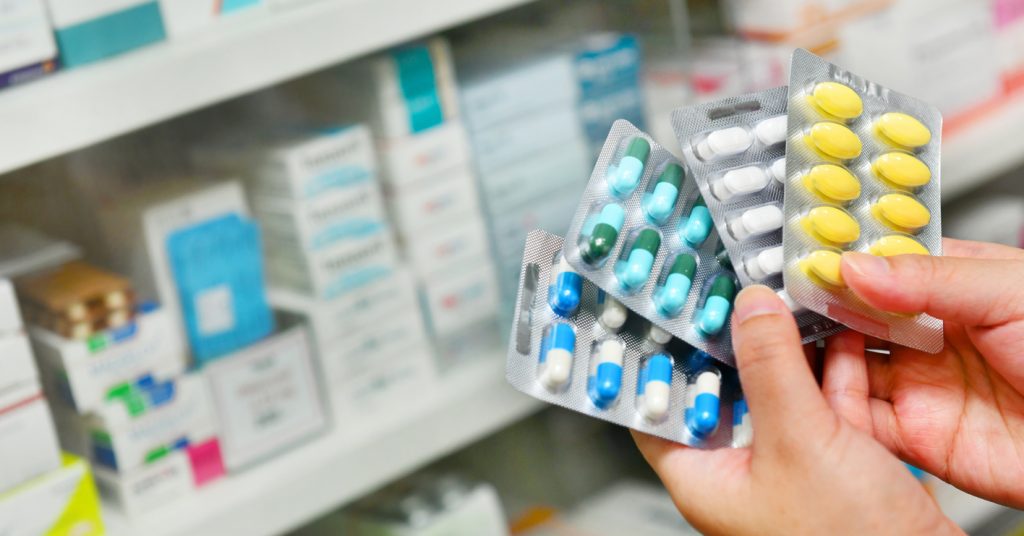Your child wakes you up at 3:00 a.m. coughing. Great, so much for those eight hours of sleep you promised yourself! You give your child the last dosage of Tylenol you have in the medicine cabinet and plan for a trip to your local pharmacy in the morning.
You plop your sick child in the car seat and drive down the road. Perhaps you have a general idea of what you might need -Tylenol, tissues, and cough medicine. As you arrive, your child seems to be feeling better, but you both head in just in case. As you wander down the children’s section of the pharmacy, you are bombarded with a seemingly endless sea of options. How do you decide? And which, if any, of these medicines have evidence to show they actually help with your child’s symptoms? Let’s talk about it.
Antipyretics/Pain-Fever Medications
Antipyretics are a class of medications that can help to reduce fever. It blocks the biological pathways that produce the proteins in our bodies responsible for generating fevers. They all also have the helpful effect of reducing pain and, in some cases, swelling. Common drugs are acetaminophen (Tylenol), ibuprofen (Motrin), naproxen (Aleve), and aspirin.
- Aspirin: Never give a child aspirin due the risk of a rare side effect called Reye’s Syndrome which can lead to liver failure and, in rare cases, death.
- Naproxen (Aleve): Naproxen, otherwise known as Aleve, is sometimes used for children with chronic inflammatory conditions but is not commonly given to children under 12 for fever or pain.
- Acetaminophen (Tylenol): Safe and commonly prescribed by doctors for children and can provide a lot of relief to your sick little one. However, many cough and cold medications already contain Tylenol, so be careful not to overdose on them.
- Ibuprofen (Motrin): Generally safe in most patients but should not be used in infants under six months due to the immaturity of the kidneys and for any patients with a chronic kidney condition.
What dosage do you use?
Doctors will use your child’s weight to give an exact dose to maximize the effect the medication can have. You can follow the dosing recommendations on the bottle. For greatest affect, alternate Tylenol with ibuprofen every three hours to achieve continuous fever suppression. For easy reference at your fingertips, St. Louis Children’s Hospital offers a free app with quick reference dosage guides for common medications such as Tylenol or Motrin.
The discussion of when to worry about fever could be another blog entirely, but if you ever have any concerns or if your child is less than two months, please call your doctor immediately as each child’s situation is very different. There is good data showing that a fever can be beneficial while sick. It helps our immune system clear out harmful bacteria and viruses and has been shown to reduce the severity of illness and the duration of illness by 1-2 days or more. However, It can also be difficult to keep our little ones hydrated when their fever is causing too much discomfort, so doctors recommend you treat your child if they appear irritable or refuse to drink.
Cough Medicines
Unfortunately, there is no cure for the common cold, and the vast majority of cough symptoms in children are due to viruses making antibiotics useless. As doctors, we know that a cough helps clear secretions and open the lungs preventing worsening symptoms and the development of pneumonia. As moms, it is so hard to watch your little one struggle and cough all night long, preventing sleep and easy breathing. The American Academy of Pediatrics recommends against the use of ANY cough and cold medicine in children under four. This is due to the risks of serious side effects like respiratory depression. There have also been numerous studies showing them to be entirely ineffective in children under the age of six, or even twelve in some studies.
So what can you do for the cough?
- Steamy showers or humidifiers: One way to loosen up phlegm is to stand in a steamy shower for 10 minutes. And cool mist humidifiers can also help loosen mucous and relieve swollen sore throats.
- Saline nasal drops or sprays: Saline helps flush the nasal cavity of the icky stuff that causes coughing. It also helps moisturize the nasal passages, which can ease sore throats and can make suctioning much easier.
- Nasal aspirators: For children who can’t blow their own noses, nasal aspirators can help you clear out their nasal passages so they can breathe a little easier. The process eliminates excess mucus from stuffy nasal passages and helps eliminate cough irritants in the process. Common brands at the pharmacy include NoseFrida, and “Bulb” suckers. You can also attach the collection unit of the NoseFrida to a breast pump for even more high-powered suction.
- Honey: Honey has been shown to reduce cough severity and duration of illness in multiple studies in both children and adults. You can mix it with warm water, tea or milk. However, NEVER give honey to infants under the age of one due to the risk of botulism.
- Lozenges: These are ok only for children over age four due to choking hazards. If your child munches on them like candy, the menthol can cause loose stools. Certain brands like Cepacol actually contain an analgesic call benzocaine which truly numbs the mouth and throat.
Always reach out with questions
Again, if you have any concerns about your child’s breathing or duration of cough, please contact your doctor. You can find additional information in our MomDocs blog “Cough it Up: When to Worry About Your Kid’s Cough.”
In general, the best thing you can do for your child’s cough and fevers is a lot of rest, suction, and, as needed, fever reducer. But if you ever have any concerns or questions about your child, please reach out to your health care provider.






Comments